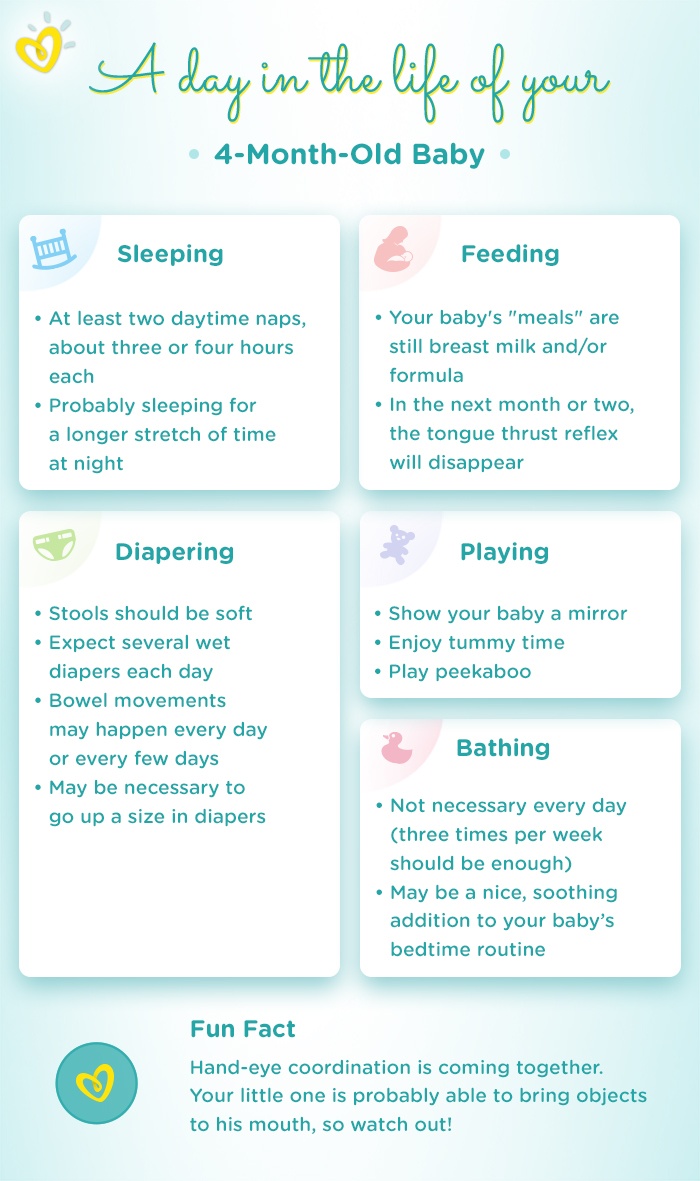
A Comprehensive Guide to Caring for a 4-Month-Old Baby
The arrival of a 4-month-old baby marks a significant milestone in their development. As they transition from the newborn stage, their needs and care requirements evolve, demanding a more comprehensive approach. This guide will provide an in-depth understanding of how to care for a 4-month-old baby, covering essential aspects such as feeding, sleeping, bathing, and stimulation.
Feeding
At 4 months of age, babies typically require 4-6 feedings per day, with each feeding lasting around 15-20 minutes. Breastfeeding remains the recommended method of feeding, as it provides optimal nutrition and strengthens the bond between mother and child. If breastfeeding is not possible, formula feeding is an acceptable alternative.
Breastfeeding:
- Position the baby comfortably in a cradle hold or football hold.
- Ensure the baby’s nose is clear and they are latched on properly.
- Allow the baby to feed until they are satisfied, which may take 10-15 minutes on each breast.
- Burp the baby frequently during and after feeding to release trapped air.
Formula Feeding:
- Prepare the formula according to the manufacturer’s instructions.
- Test the temperature of the formula on your wrist to ensure it is lukewarm.
- Hold the baby in a semi-upright position and support their head.
- Use a bottle with a slow-flow nipple to prevent overfeeding.
- Burp the baby frequently during and after feeding.
Solid Foods:
At 4 months, babies are not yet ready for solid foods. However, they may begin to show interest in what you are eating. You can introduce them to different flavors by offering them small tastes of pureed fruits or vegetables on a spoon.
Sleeping
4-month-old babies typically sleep for 14-16 hours per day, with 2-3 naps throughout the day. Establishing a regular sleep schedule is crucial for their well-being.
Creating a Sleep Environment:
- Ensure the baby’s sleep environment is dark, quiet, and cool.
- Use a white noise machine or fan to create a soothing atmosphere.
- Swaddle the baby snugly to provide a sense of security.
Establishing a Sleep Routine:
- Put the baby to bed at the same time each night.
- Create a calming bedtime routine that includes a warm bath, massage, and lullaby.
- Avoid feeding the baby right before bed, as this can interfere with sleep.
Naps:
- Allow the baby to nap for 1-2 hours at a time.
- Place the baby in a safe sleep space, such as a crib or bassinet.
- Avoid waking the baby from naps prematurely.
Bathing
Bathing a 4-month-old baby is an important part of their hygiene and well-being. It helps keep their skin clean and prevents diaper rash.
Materials:
- Baby bathtub or sink
- Warm water
- Baby soap
- Washcloths
- Soft towels
Steps:
- Fill the bathtub or sink with 2-3 inches of warm water.
- Test the water temperature on your elbow to ensure it is not too hot or too cold.
- Undress the baby and place them in the water.
- Use a washcloth to gently wash their face, body, and hair.
- Rinse the baby thoroughly with warm water.
- Wrap the baby in a soft towel and pat them dry.
Stimulation
4-month-old babies are becoming increasingly curious and interactive. Providing them with appropriate stimulation is essential for their cognitive and physical development.
Tummy Time:
- Place the baby on their tummy for short periods throughout the day.
- Encourage them to lift their head and chest.
- Use toys and objects to stimulate their interest.
Sensory Play:
- Introduce the baby to different textures, sounds, and colors.
- Play music, sing songs, and read books to them.
- Provide them with safe toys that encourage exploration.
Social Interaction:
- Talk to the baby frequently, using a gentle and soothing tone.
- Make eye contact and smile at them.
- Engage them in peek-a-boo and other interactive games.
Health and Safety
Ensuring the health and safety of a 4-month-old baby is paramount. Regular checkups with a pediatrician are essential for monitoring their growth and development.
Vaccinations:
- At 4 months, babies typically receive vaccinations for diphtheria, tetanus, pertussis (whooping cough), Haemophilus influenzae type b (Hib), and pneumococcal disease.
- These vaccinations are crucial for protecting the baby from serious illnesses.
Diaper Changes:
- Change the baby’s diaper frequently, especially after feedings and naps.
- Use a gentle diaper cream to prevent diaper rash.
- Dispose of soiled diapers properly.
Crying:
- Crying is a baby’s primary means of communication.
- Determine the cause of the crying by checking for hunger, wet diapers, discomfort, or illness.
- Respond to the baby’s cries promptly and calmly.
Conclusion
Caring for a 4-month-old baby is a rewarding yet demanding task. By understanding their unique needs and providing them with appropriate care, you can ensure their optimal growth and development. Remember to consult with a pediatrician regularly for guidance and support. With patience, love, and a comprehensive approach, you can provide your little one with the best possible start in life.
